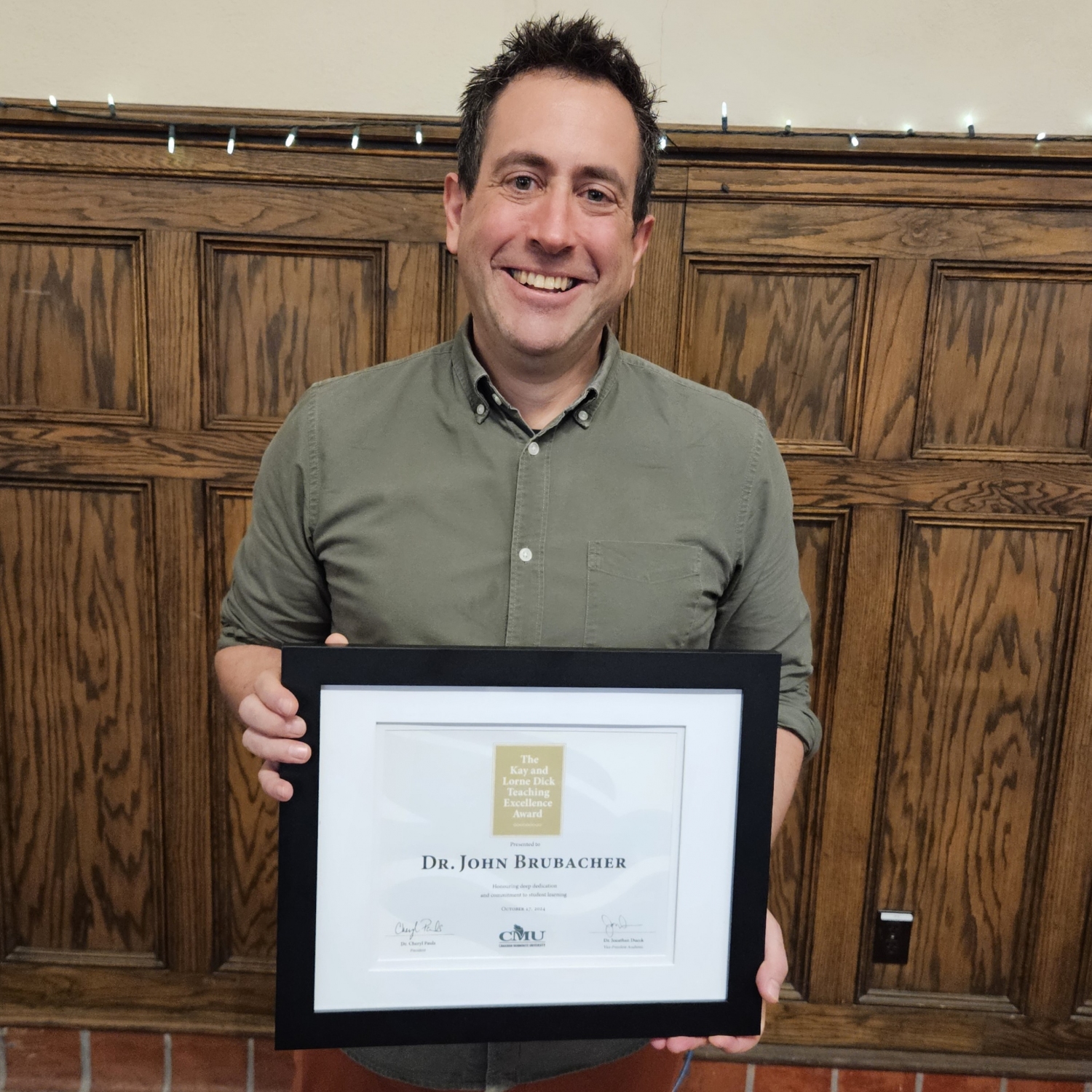News and Releases

Faculty Profiles
Dr. John Brubacher | 2024 Kay and Lorne Dick Teaching Excellence Award Recipient (video)
Tuesday, February 18, 2025 @ 3:47 PM | Faculty Profiles

Dr. John Brubacher, Associate Professor of Biology, has worked at CMU since 2008. He and Lynda Loewen, Teaching Assistant Professor of Psychology, are co-recipients of the 2024 Kay and Lorne Dick Teaching Excellence Award.
The award, established in 2022, is granted annually to two faculty members who best exemplify CMU's commitment to excellent teaching.
Is there a specific moment in your teaching career that stands out as especially rewarding?
You'll often hear teachers talk about that moment when you see the light go on, when there is an "aha" moment for a student. One of my favorite things to do in the first lab for a course I teach called Cells and Energy, when we're learning how to use microscopes, is I have students look at some pond water. I go to the pond out by Marpeck [Commons], bring in some pond water and make sure it's got a lot of good pond scum in it, and then students just see what they can see. At that point, it doesn't matter if they can identify what they see or not, but just to look at it and appreciate it and make science a bit more of a sensory experience. To hear people get really excited, like "what is THIS?!" and you run over and have a look and maybe it's something I know a bit about and then we can talk about what that little creature is. It's kind of like being a kid again, because ultimately that's what science should be! When students have the opportunity to present their own work—like in a lot of our upper-year science classes we'll finish with students talking about a project they've been working on in the lab—and to see them become storytellers, is a fantastic experience. Tomorrow I have a student who's been working on an independent study this fall and she's going to be presenting on her work and I can't wait!
What strategies do you use to engage and inspire your students?
It's funny because I think in a lot of ways, I'm quite old-fashioned in the way I teach. My classes tend to be lecture heavy...but I think lectures get a bit of a bad rap. When someone says that someone lectures a lot as a teacher, we have in our minds the history teacher from Ferris Bueller's Day Off droning on in a monotone. Why do we evaluate lectures on the basis of the worst examples of what a lecture can be? We're all riveted when we have the opportunity to watch a Ted Talk—which is just a lecture. If lectures can be storytelling, unraveling or solving a mystery, or introducing tension that gets resolved, then it can be a way of bringing students in and engaging their interest. The summer before I started teaching at CMU, I remember talking with a friend of mine who was an English prof at University of Waterloo. And her advice to me was, "play to your strengths and expect surprises." Teaching goes best when it's a natural extension of who you are and I think I function best when I'm acting as a bit of a storyteller, so that's what I try to do to engage students. There needs to be some kind of characters involved, even if those are inanimate objects, like chemicals. You're not going to remember a grocery list, but you will remember the plot of the movie you watched years ago.
How do you balance academic rigour with making learning enjoyable for your students?
Rigour can be enjoyable! In life, when we do well at something that's difficult, that's rewarding. There's nothing more frustrating, at least for me as a student, than feeling like I'm succeeding at a really low bar. The opportunity to show you really know what you're doing can be fun. So, balancing rigour and making a course enjoyable—I don't feel like it's that much of a balancing act.
What impact do you hope to leave on your students?
I would like them to fall in love with the subject—or at least not have their curiosity about a subject extinguished. To have done something to kindle their interest and for them to remember their time at CMU as being a time of being able to sink their teeth into learning stuff and having that learning be meaningful, not just enjoyable. Also for them to be able to see that this learning transfers into something else [they're] doing. I teach a lot of students for whom science is not going to be the thing they spend the rest of their life doing, but I think having some sort of scientific literacy is super important for everyone. If that's something I can play a part in, helping someone feel like they can listen to the news and interpret it with a little more nuance than they might have been able to before, that's great.
Previous recipients of the Kay and Lorne Dick Teaching Excellence Award:
2023
- Jodi Dueck-Read, Assistant Professor of Conflict Resolution Studies and Peace and Conflict Transformation Studies
- Dr. Candice Viddal, Associate Professor of Chemistry and Physics
2022
- David Balzer, Associate Professor of Communications and Media
- Karen Ridd, Teaching Associate Professor of Peace and Conflict Transformation Studies, and of Conflict Resolution Studies
KEYWORDS: John Brubacher, Teaching Excellence Award, faculty, science, biology, academic excellence, Kay and Lorne Dick Teaching Excellence Award, video

 Print This Article
Print This Article